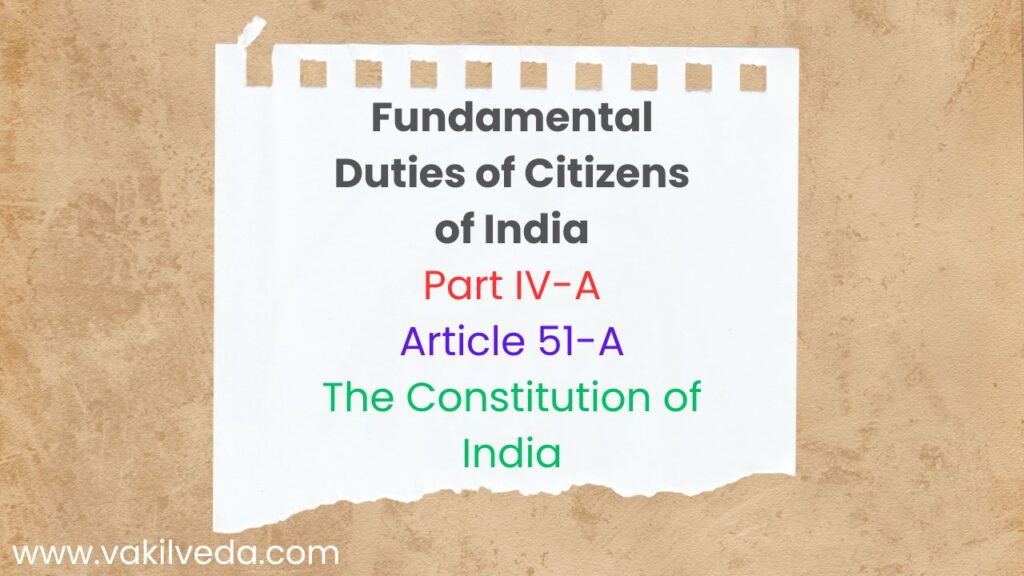
Fundamental Duties were not originally present in the Constitution of India drafted under the Chairmanship of Dr. Rajendra Prasad but in the year 1976, the Constitution (Forty-second) Amendment Act, 1976 introduced the concept of Fundamental Duties of the Indian Citizens under the Indian Constitution. Fundamental Duties were added to the Constitution by introducing Part- IVA consisting of Article 51A. It was a very creative and innovative idea of the Parliament to introduce these duties. These duties are Eleven in number. Initially, there were Ten Fundamental Duties and later in 2002, one more Fundamental Duty {Article 51A- (k)} was instituted by the Constitution (Eighty-sixth Amendment) Act, 2002. These duties are confined to the Indian citizens only and these do not extend to foreign nationals.
Source-
The Concept of Fundamental Duties under the Indian Constitution is surprisingly inspired by the Constitution of the then USSR (Union of Soviet Socialist Republics). Except in the Constitution of Japan, none of the Constitutions of major democratic countries like the USA, Canada, France, Germany, Australia etc. contain any sort of list of duties of its citizens. The reason behind the USSR having these duties under its own Constitution is that the then USSR was a Socialist country.
Committee for Fundamental Duties-
During the period of Emergency, in 1976 the then ruling party, Congress set up the Sardar Swarn Singh Committee for the Fundamental Duties. The Committee recommended setting up a new and detailed chapter for Fundamental Duties. Thereafter on the recommendations of the Committee 42nd Constitutional Amendment was enacted in 1976. Yet the Committee recommended the incorporation of only the essential Eight Duties. But surprisingly the Constitution (Forty-second) Amendment Act, 1976 introduced Ten Duties. Some of the recommendations of the Committee were not accepted which were:
- The Parliament may provide for the imposition of such penalty or punishment as may be considered appropriate for any non-compliance with or refusal to observe any of the duties.
- No law imposing such penalty or punishment shall be called in question in any court on the ground of infringement of any Fundamental Rights or on the ground of repugnancy to any other provision of the Constitution.
- Duty to pay taxes.
Fundamental Duties-
According to Article 51A of the Constitution of India, it shall be the duty of every citizen of India:
- to abide by the Constitution and respect its ideals and institutions, the National Flag and the National Anthem;
- to cherish and follow the noble ideals which inspired our national struggle for freedom;
- to uphold and protect the sovereignty, unity and integrity of India;
- to defend the country and render national service when called upon to do so;
- to promote harmony and the spirit of common brotherhood amongst all the people of India transcending religious, linguistic and regional or sectional diversities; to renounce practices derogatory to the dignity of women;
- to value and preserve the rich heritage of our composite culture;
- to protect and improve the natural environment including forests, lakes, rivers and wild life, and to have compassion for living creatures;
- to develop the scientific temper, humanism and the spirit of inquiry and reform;
- to safeguard public property and to abjure violence;
- to strive towards excellence in all spheres of individual and collective activity so that the nation constantly rises to higher levels of endeavour and achievement
- who is a parent or guardian to provide opportunities for education to his child or, as the case may be, ward between the age of six and fourteen years.
Enforceability of Fundamental Duties-
After the perusal of these duties, it appears that these duties are not foreign to us. These seem an essential and unforgettable part of our Indian tradition, mythology, culture, religion, and practices. These duties are simply directory in nature and do not attract any kind of punishment in the event of non-compliance. These can at best be regarded as Directory in nature. Unlike the Fundamental Rights, these duties are surprisingly not enforceable. In Surya Narayan vs Union of India (AIR 1982), the Supreme Court has said that “as regards enforceability of these duties, it has been held that these duties being duties of individual citizen cannot be enforced through mandamus.”


